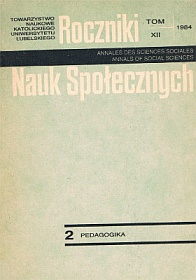Struktura i funkcjonowanie świadomości moralnej (Przegląd literatury)
Abstrakt
The paper presents opinions of different authors on the concept of moral sense (e. g. tardy, accompanying reflective consciousness, the consciousness of self, present, and potential consciousness), and assessments of its structure (e. g. A. Gołąb). Next, selected elements of moral sense are presented: knowledge, moral concepts (concepts of obligations, norms, standards as well as those concerning one’s own self — one’s own moral features, one’s own real, social and ideal »1“), opinions, views, assessments and moral beliefs, sensitivity and the sense of moral obligations, conscience, value directions and preferential arrangement of moral norms. The author also points out to the mutual relationships between moral sense and such extra-cognitive elements of moral sphere as moral sense and feelings, moral attitudes, personal pattern and ideal and moral character. The problem of the dynamizing and regulating influence of moral sense on the sense of one’s own value, opinion of oneself, self-criticism and behaviour is shown.
The author discusses the role of verbalization in moral sense’s development; the question raised is to what extent the development of a child’s language competence can effect the formation of its moral sense (special attention is paid to the role of the verbal contact in the formation of moral sense among blind children). The research on moral sense’s function in a development aspect are divided into nine problem groups. The groups are formed in the shape of bipolar dimensions which characterize different aspects of moral sense: e.g. intentionality, the concept of moral rule, moral punishment, the sense of obligation, from heteronomy to autonomy. A survey of papers on the subject is made.
Copyright (c) 1984 Roczniki Nauk Społecznych

Utwór dostępny jest na licencji Creative Commons Uznanie autorstwa – Użycie niekomercyjne – Bez utworów zależnych 4.0 Międzynarodowe.


